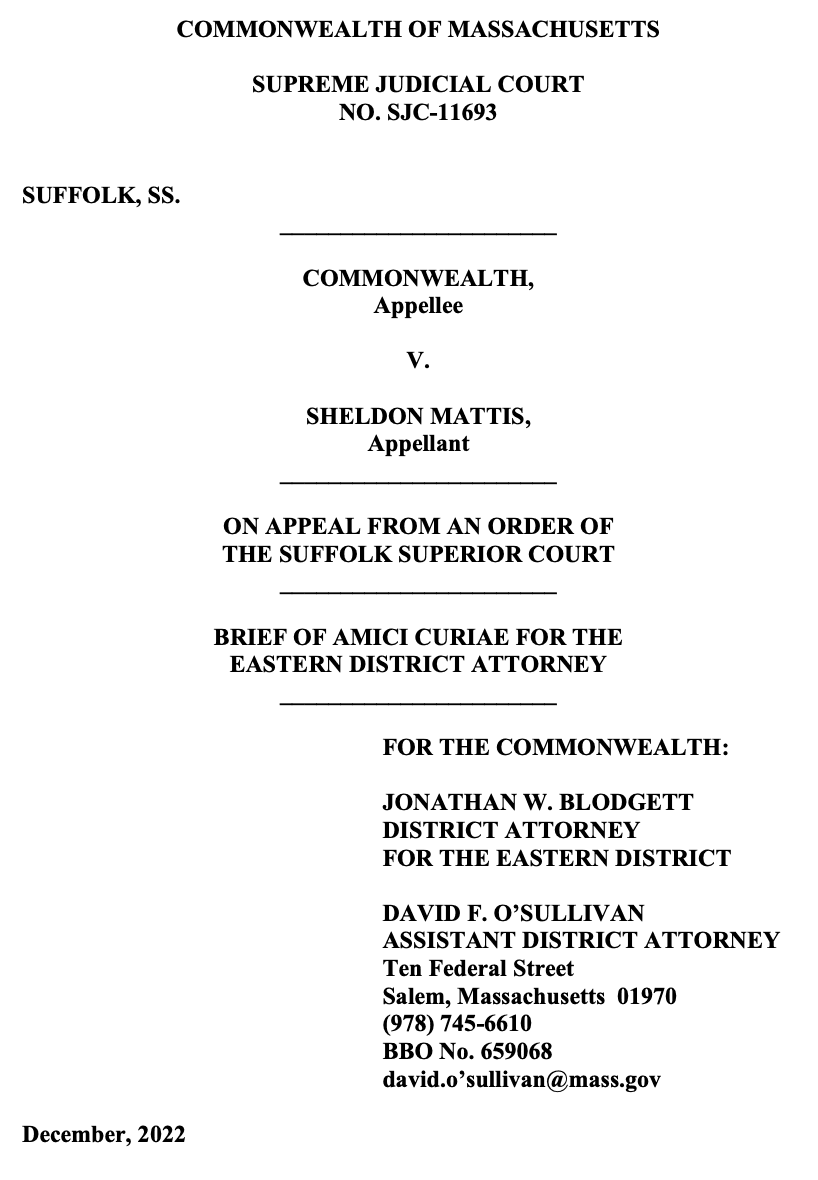
Summary of Argument
In Miller v. Alabama, 567 U.S. 460 (2012), relying on developmental science first noted in Roper v. Simmons, 543 U.S. 551 (2005), the United States Supreme Court held that the 8th Amendment1 bars mandatory LWOP for juvenile offenders, and mandates an individualized sentencing hearing that considers the hallmark features of youth -- the so-called “Miller factors”2 -- before sentencing such a juvenile to LWOP. Citing this same science, this Court held in Diatchenko v. District Attorney for the Suffolk Dist. (Diatchenko I), 466 Mass. 655, 668 (2013) that Art. 263 provides greater protections, and bars even discretionary imposition of LWOP for juveniles. For the purpose of both rules, “juveniles” were defined as those under age 18. Diatchenko I, 466 Mass. at 659 & n. 8 (“When we use the term ‘juvenile’ offenders here, we are referring to defendants who were under the age of eighteen at the time they committed murder in the first degree. See G.L. c. 119, § 72B, as amended through St. 2013, c. 84, § 24.”).
Defendants Sheldon Mattis and Jason Robinson were, respectively, 18 and 19 at the time of their commission of first-degree murder.4 Under G.L. c. 265, § 2, both were sentenced to mandatory LWOP. They now have proffered developmental science, most post-dating Diatchenko, which finds among 18 to 20 year olds markers of neuronal immaturity similar to juveniles. The proffered science pertains to average neuronal immaturity in this age set; it was not particularized to these defendants. The defendants’ essential claim was straightforward: since the science shows developmental similarities among juveniles and 18-20 year olds, art. 26 at a minimum forbids mandatory imposition of LWOP for this age group, and requires Miller hearings before the imposition of any such sentence. 5 On remand order of this Court, the Superior Court (Ullman, J.) conducted an evidentiary hearing at which the affidavits and testimony of four experts were admitted -- Dr. Laurence Steinberg, a developmental psychologist; Dr. Adriana Galvan, a developmental cognitive neuroscientist; and Drs. Robert Kinscherff and Stephen Morse, both attorneys and forensic psychologists. Ullman decision, 10-11. Also admitted were seven scientific articles ranging from 2008 to 2022, six of which were co-authored by Drs. Steinberg and/or Galvan. Id. On the basis of this evidence, Judge Ullman made certain “core findings” concerning age and brain development, id. at 15-18, and held on the basis of those findings that art. 26 forbids mandatory LWOP for 18-20 year olds. Id. at 2. Following remand, though the vast majority of Courts have declined to extend Miller to legal adults,6 the defendants ask this Court to join one state, Washington, that has extended Miller to 18 through 20 year olds,7 and one other, Michigan, that has extended it to 18 year olds,8 each over vigorous dissents.
The Court should not accept this invitation. In deciding the question, this Court should strictly apply its own tripartite standard for evaluating punishments as “cruel or unusual” under art. 26.9 Applying this standard is essential because it demarcates the boundary between legislative and judicial functions mandated by art. 30.10 Adherence to it ensures that legislative prerogatives are not trespassed, that an ongoing democratic process is not short-circuited, and that constitutional analysis does not become a proxy for imposition of the policy preferences of the judiciary. Application of that standard would hold the current sentencing scheme constitutional, in light of the gravity of the crime and nature of offender in this older age group, the punishments for other offenses, and those in other jurisdictions for the highest degree of murder. While Judge Ullman’s core findings are not clearly erroneous, for the reasons that follow, they do not compel differing constitutional treatment for 18-20 year olds than for those 21 and older.
An additional threshold point bears noting. While the defendants’ claims pertain only to sentencing, the developmental science on which the defendants rely does not. The proffered science is also plainly relevant to and, per decisions of this Court, may be used to litigate a defendant’s mental state at the time of the crime in the guilt phase. See Commonwealth v. Fernandes, 487 Mass. 770, 782 (2021), cert. denied sub nom. Fernandes v. Massachusetts, 142 S. Ct. 831 (2022)(permitting expert testimony with respect to “‘general principles and characteristics of the undeveloped adolescent brain’ when it is accompanied by other evidence, such as testimony by a different expert, or medical or school records, specific to the defendant”). Post-trial, it may be used to argue for a reduction of the degree of murder under G.L. c. 278, § 33E or Mass. R. Crim. P. 25(b)(2), or in support of a new trial motion, again where particularized to an individual defendant. See Commonwealth v. Johnson, 486 Mass. 51, 69 & n. 16 (2020)(“We agree that the mental maturity of an individual defendant is relevant to our analysis under § 33E.”). The question before this Court concerns the legislature’s ability to fix punishment for those in this age group after they were convicted, in a fair trial and beyond a reasonable doubt, of the required elements of first degree murder.